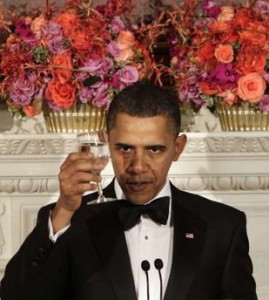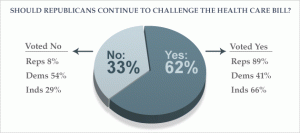Common sense in the United States of America in March of 2010 appears to be that the Obama Administration has mishandled the ongoing attempts to fix the root causes of September 2008’s meltdown. Only a rump 18% agree with Obama that he has taken “enough action” while 79% think Obama has failed to properly address the root causes of the meltdown, with 42% saying Obama “has gone too far and taken action that will be harmful down the road” and the other 37% saying Obama “has taken too little action”. Here’s the exact wording of the question and the results:
When President Obama took office, he said he was determined to address the roots of the financial crisis so that another meltdown would not happen. Do you believe the government has taken enough action to fix what was wrong in the financial industry, has taken too little action, or do you think the government has gone too far and taken action that will be harmful down the road?
18% Has taken enough action
37% Has taken too little action
42% Has gone too far and taken action that will be harmful down the road
The complete repudiation of the Obama economic program by the American public is further reinforced by the similar finding that Americans say by a 2-1 margin that the economy has worsened under the Obama Administration:
By an almost 2-to-1 margin Americans believe the economy has worsened rather than improved during the past year, according to a Bloomberg National Poll conducted March 19-22. Among those who own stocks, bonds or mutual funds, only three of 10 people say the value of their portfolio has risen since a year ago.
During that period, a bull market has driven up the benchmark Standard & Poor’s 500 Index more than 73 percent since its low on March 9, 2009. The economy grew at a 5.9 percent annual pace during last year’s fourth quarter.
“It’s very difficult to turn perceptions around once you’ve been through the proverbial economic wringer,” says Mark Zandi, chief economist for Moody’s Economy.com. “Everything is colored by the fact that unemployment is near 10 percent. It doesn’t really matter what you ask, you’re going to get the same answer.”
Zandi says the poor performance people report on their investments “is very telling. It’s just a fact that everyone’s stock portfolio is up, or nearly everyone’s.”
Obama’s oft-repeated claim that increased government action is necessary to save the economy is also explicitly repudiated by most Americans, with an overwhelming 78% saying that the “expansion of the government’s role in the economy” is either a “high” or “medium” threat to “economic performance in the U.S. over the next two years” and only 19% saying government economic incursions are a “low” threat. Only 3% say they are not sure of the level of threat to the economy, showing the level of engagement by Americans in economic issues.
Such findings appear to be the end result of the Obama Administration’s 14 month long (and counting), obsessive focus on pushing through the 2407-page Obamacare package and the resultant lack of sustained, substantive focus on creating reasonable, bipartisan, centrist reforms to address the root causes of the September 2008 financial crisis. Indeed, 72% of Americans see economic issues (31% economy, 22% government spending/deficit, 19% unemployment) as the most important facing the country right now, while only 22% feel the that way about health care:
Which of the following do you see as the most important issue facing the country right now?
31% Economy
22% Health Care
22% Government spending / deficit
19% Unemployment
5% Afghanistan
These findings certainly explain why Obama’s strategists have attempted to wrap the Obamacare package in very questionable rhetoric regarding deficit reduction, job creation and general economic well-being. Americans also have little confidence in Obama’s Stimulus package, with just 37% thinking it has done any good at all:
The Obama Administration has made no progress over the past three months convincing the public that the $787 billion stimulus package passed last year either helped the economy or prevented greater deterioration. Only 37 percent of the public say they see positive effects, the same portion who said so in a December poll.
Despite the entire country’s demand for a more effective and sustained focus on economic issues by the Obama Administration, Americans also are so uncomfortable with the Obamacare package that 62% want the GOP to continue fighting Obama and the Democrats on Obamacare (see chart).
Taken together, the desire of Americans to both see the GOP keep fighting Obamacare while also wanting the Obama Administration to improve its performance and focus more on economic issues creates a truly “toxic” political environment for President Obama as we approach the 2010 elections. The GOP will clearly be emboldened by the large majority egging them on to keep fighting, and Obama will be forced to respond, and such continued health care infighting will in turn also disappoint Americans who want Obama to improve and increase his focus on economic policy. Finally, the newly-filed multistate litigation by State Attorneys General, which is sure to last for months at a minimum, may also act as a wildcard in the national political scene that carries the risk for Obama of incurring a crushing Supreme Court ruling finding Obamacare unconstitutional.



